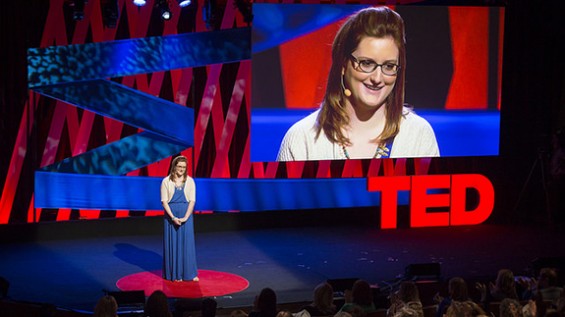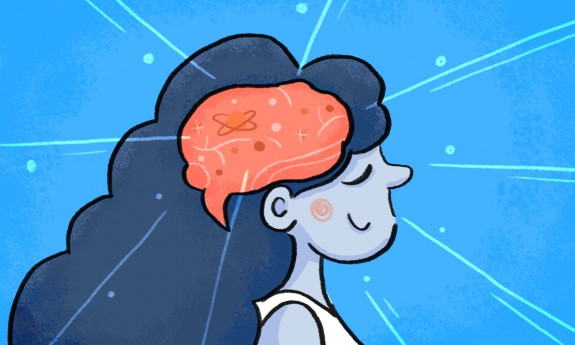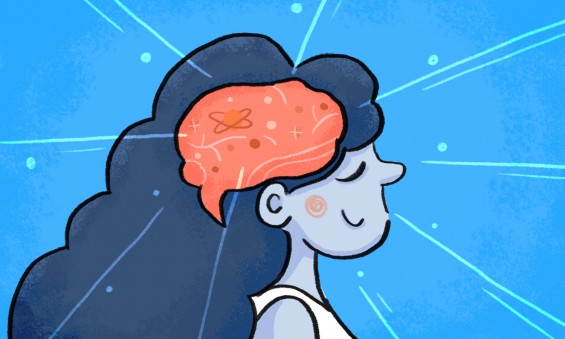
A Q&A about autism with Steve Silberman, author of NeuroTribes
Steve Silberman is a writer and contributing editor for Wired, and the author of NeuroTribes: The Legacy of Autism and the Future of Neurodiversity (which will be out in paperback on the 23rd). He gave a TED Talk on the forgotten history of autism, and recently spoke before the United Nations on the need for acceptance and understanding of neurodiversity. In the must-read interview below, he explores what teachers need to know about autism and neurodiversity. “If you understand that the autistic students in your class are just as complex and nuanced and intensely emotional and hopeful as you are,” says Silberman, “you’ll do everything in your power to help them lead happier and more engaged lives.”
The history of autism makes clear that the notion that there is one best way to learn, one best way to experience the world, and one best way to be human, is bunk.
Michael McWatters: Why should an educator learn about the history of autism? I’m not just thinking of teachers who work with special needs students, but those who work with typical children as well.
Steve Silberman: In part, learning the history can help them avoid making the same mistakes that educators and clinicians made in previous generations — such as believing that there is a normal child trapped behind the “autistic shell.” As a society, the history of autism makes clear that the notion that there is one best way to learn, one best way to experience the world, and one best way to be human, is bunk. That belief prevailed through most of the 20th Century, when psychiatrists elevated themselves into a position akin to secular priests. But it’s based on a false model of how human brains work, and it ends up stigmatizing and marginalizing people who have tremendous gifts to offer society. Think about it: why would the community of human minds be less diverse than, say, a rainforest? But it isn’t. We’re part of the natural world, and nature thrives by experimenting, by fostering the development of many different types of individuals. In a rainforest, this wild riot of variety and difference makes communities of plants and animals more resilient in the face of changing conditions. As we face the challenges of the 21st Century — which include a rapidly changing global climate! — we will need many different types of minds working together. As a teacher, you’re helping to build the foundation on which the fate of humanity may depend.
Think about it: why would the community of human minds be less diverse than, say, a rainforest?
MM: As the parent of an autistic child myself, I feel grateful that he’s growing up in a time and place where, for the most part, he’ll have opportunities denied earlier generations of autistic children and adults. And yet, there’s still a lot of work to be done in the United States. If you could change anything about our approach to educating autistic and other neurodivergent children, what would it be? How is educating autistic kids handled in the rest of the world? Any schools or countries you want to highlight?
SS: It’s easy to forget that for most of the 20th Century, autistic kids were thought by experts to be not just developmentally delayed, but uneducable — literally incapable of learning. This is not surprising, because the recommended course of treatment for autism was institutionalization, and there was no Special Ed going on in psych wards. Then before the passage of the Education for All Handicapped Children Act — the predecessor to the Individuals with Disabilities Education Act (IDEA) — kids with autism were routinely excluded from public schools. The fact that we’re even talking about “changing our approach” represents that society has taken huge steps forward toward inclusion in the past couple of decades, due to the efforts of autism parents like Ruth Sullivan, co-founder of the Autism Society of America, and civil-rights activists who are disabled themselves.
But we’re still just in the first years of discovering which sorts of accommodations and supports help autistic students thrive. The principles of Universal Design for Learning can be very helpful for teachers who want to know more about ways of customizing core curricula to suit the learning styles of individual students. Obviously, the foundational principle of these efforts must be presuming competence — believing in the potential of your students, and doing everything you can to help them realize that potential, rather than viewing them as checklists of deficits and dysfunctions that must be “handled” in the classroom. I can’t tell you how many parents have come up to me after my talks to tell me that when their son or daughter was first diagnosed, they were told that their child would never be capable of going to a mainstream school — and now they’re graduating from college. In fact, one of my autistic friends, Mark Romoser, was diagnosed by Leo Kanner himself. He told me, “Kanner told my mother to put me in an institution. So she did — Yale.” Obviously, not all autistic kids are capable of going to Yale, or even to college. But as schoolteachers say in Finland, “We can’t afford to waste a brain.”
One of my suggestions for improving education is very basic: pay teachers more. Pay them like the professionals they are — highly valued professionals with the crucial job of putting kids on the pathway to success and a fulfilling life.
One of my suggestions for improving education is very basic: pay teachers more. Pay them like the professionals they are — highly valued professionals with the crucial job of putting kids on the pathway to success and a fulfilling life. The average salary for a middle school teacher in the United States is $45,000, which is a full third less than we pay dental hygienists. That’s not enough for someone to live, much less support a family, with the rents we’re all paying now. When I’ve visited good schools for special-needs kids like the Morgan Autism Center in San José and Ambitious About Autism in London, the tireless dedication and profound care the teachers had for their students was nothing less than awe-inspiring. I’m sure it’s deeply gratifying work, but as a society, we should treat teachers with more respect by paying them a living wage.
Another suggestion for improving education for autistic kids: create opportunities for mentorship by autistic adults. Invite autistic self-advocates into the classroom to give talks and team up with students for projects. Nothing sends a more encouraging message to a young autistic kid than hearing from someone who’s been there, dealt with similar challenges, and figured out practical ways of making life work. Encourage the students to read writing by autistic authors, and then invite autistic adults to become part of the teaching process. The neurotypical students would benefit from hearing from them too.
MM: Some experts believe you shouldn’t indulge an autistic child’s obsessions. The fear seems to be that obsessions naturally become barriers between the child and the outside world. And yet history provides myriad examples of autistic obsessions leading to incredible breakthroughs for humanity, some of which you’ve documented in NeuroTribes. What are your thoughts on encouraging an interest — even one that might appear obsessive — versus redirecting a child away from it?
SS: Kids on the spectrum learn and develop in different ways than typical kids. They have their own distinct trajectories. Hans Asperger and his colleagues figured this out way back in the 1930s. He described one of his young patients who became an assistant professor of astronomy because his mother encouraged his special interests in geometry and math from the age of two onward. In middle school, the boy practically had to beg his teachers to give him advanced tutoring in math, because they thought he wasn’t capable of working at that level. Then, in first year at university, he detected an error in one of Isaac Newton’s proofs. Asperger was careful to note that it wasn’t that this young man had somehow grown out of autism — he was still, in Asperger’s words, “blatantly autistic.” But he succeeded because he was supported in pursuing his special interests.
In the 20th Century, there were all kinds of theories about how you had to “break” kids out of their “autistic shells” by punishing them — often quite brutally — for their “obsessions.” But even behaviorist Ivar Lovaas, who popularized this theory, eventually admitted that he was wrong: there was no normal child inside the autistic shell. Indeed, there was no shell. Instead, there was an autistic person needing support. And autistic people learn by going narrow and deep rather than broad and shallow. Temple Grandin‘s curious fascination with barnyard animals raised alarm for the psychologist at her high school — “We don’t think we’re a cow, do we?” he condescendingly said to her. But her science teacher, Bill Carlock, encouraged Temple’s passion for animals, and that became her doorway into science, which became the foundation of a very successful career in a highly demanding field. In Life, Animated, Ron Suskind describes a similar process of becoming closer to his autistic son Owen by attending to his interest in all things Disney. This is a truth that autism parents have been discovering on their own for generations, often against the advice of the “experts.”
MM: You as well as others have criticized the labels “high functioning” and “low functioning.” Why do you think it’s important to move away from these labels? Are there other, less fraught ways to convey ability?
SS: Here’s the thing: both terms obscure more than they reveal. So-called “high functioning” people are often struggling more behind the scenes than is obvious to the casual neurotypical observer, while allegedly “low functioning” people often have talents and abilities that could be brought out and cultivated if they were provided with appropriate means for communication and were not constantly in environments in which they feel overwhelmed.
Equally to the point, even “high functioning” people can temporarily lose speech while under conditions of extreme stress. Functioning labels are not only demeaning, they’re unstable — as my autistic friend Carol Greenburg, who has an autistic son, puts it, “Some days are more autistic than others.” I believe the persistence of these labels reflects one of the historical misconceptions that I tried to dispel in my book: that Leo Kanner saw only “low functioning” children, while Hans Asperger saw only “high functioning” ones. As I explore in depth in NeuroTribes, this framing is wrong from both directions. Asperger saw more than 200 kids, at all levels of ability, including those who would need support every day of their lives. But he only told his Nazi bosses about his “most promising cases,” in part because they were actively involved with exterminating disabled children en masse in accord with eugenics laws from Berlin. And Leo Kanner’s early patients included a man who would go on to get married, serve in the Navy, become a meteorologist, and compose pieces that were played by symphony orchestras. I have no doubt that some of Kanner’s patients would have been diagnosed with Asperger’s syndrome had they been born later, and that some of Asperger’s patients would have met Kanner’s very strict criteria for a diagnosis of early infantile autism. So, where is the bright line dividing these allegedly very distinct clinical populations? There isn’t one. Each autistic person is different, and in fact, as autistic self-advocate Jim Sinclair observed, autistic people are more different from one another than neurotypical people are.
Taking a cue from autistic self-advocates, I prefer to use the phrases “high support needs” and “low support needs” — noting that the level of need can change day to day, or even moment to moment. They’re not only less dehumanizing terms, they’re more accurate.
MM: Douglas Biklen once said that we should assume “that a child has intellectual ability, provide opportunities to be exposed to learning, assume the child wants to learn and assert him or herself in the world. To not presume competence is to assume that some individuals cannot learn, develop, or participate in the world. Presuming competence is nothing less than a Hippocratic oath for educators.” What are your thoughts on this advice to those educating autistic and neurodivergent students? How can they “presume competence” while simultaneously taking special measures to support their students?
SS: Never assume that the ability to speak equals intelligence. There are plenty of autistic people who have trouble speaking but who have glorious creative worlds inside them seeking avenues of expression. Never assume that an autistic person who can’t speak isn’t listening closely to every word you say, or isn’t feeling the emotional impact of your words. I’ve interviewed many autistic people who said they could hear and understand everything around them while people called them “idiots” or described them as “out of it” to their faces. Ultimately, presuming competence is the ability to imagine that the person in front of you is just as human as you are, even if they seem to be very impaired. If you understand that the autistic students in your class are just as complex and nuanced and intensely emotional and hopeful as you are, you’ll do everything in your power to help them lead happier and more engaged lives.
Inclusion sends a crucial message to all students: If you’re born disabled or become disabled in your lifetime, society will build a place for you.
MM: There’s a wonderful quote in your book by writer Barry Morrow about his friend Bill Sackter, the inspiration for the main character Raymond Babbitt in the movie Rain Man: “What Bill taught me is that not only do people like Bill need society, but society needs people like Bill.” Can you elaborate on that thought and, in particular, how it might relate to schools and classrooms? What is the social and emotional impact of having a neurodiverse student body?
SS: The virtues of inclusion go far beyond some notion of charity or being generous to the disadvantaged. The presence of disabled children in a classroom teaches both disabled and non-disabled kids that disability is nothing to fear or hate, and that disability is part of the human experience. If we’re lucky enough to live to an old age, we all become disabled eventually. Inclusion sends a crucial message to all students: If you’re born disabled or become disabled in your lifetime, society will build a place for you. You will not be cast out, discarded, left behind, or shunned as broken or inferior. This, in turn, reduces bullying, as several studies have shown. Disabled students who are not bullied will grow up to become happier, less stressed-out, and more confident, which will enable them to advocate for their own needs more effectively. I know that mainstreaming is not appropriate for every child. But the practice of inclusion boils down to giving every child what they need to realize their maximum potential and have the best chance of success.
MM: If you could offer one bit of advice to educators who regularly work with autistic and neurodiverse students, what would it be?
SS: Listen to autistic and other neurodivergent people. Read books by them, follow their blogs and tweets, and talk to them in person. There’s nothing like first-person perspectives to illuminate the experience of life for people who think differently. I would also recommend a book called Uniquely Human: A Different Way of Seeing Autism by Barry Prizant and Tom Fields-Meyer. It offers very helpful and compassionate insight into autistic experience of the sensory world and the nature of “difficult” behavior.
MM: It’s clear that NeuroTribes is a project you approached not only with great professionalism, but with great passion. How has this experience affected you personally?
SS: That passion increased as I did my research, because it became clear to me how many horrific abuses had been heaped on autistic people through the decades — everything from electric shocks, dangerous experimental “treatments,” lifelong institutionalization, and actual genocide, to the less-obvious bigotry of describing autistic children as being the hapless victims of a vaccine-induced global epidemic. The other day, I saw a video clip of Del Bigtree, the producer of Andrew Wakefield’s propaganda film Vaxxed, comparing autistic children to dogs and chimpanzees, because their minds are apparently incomprehensible to him. People used to talk that way about people of color too. Gay people like me were routinely described as sex-obsessed psychopaths and predators with mother issues, whose practices in the bedroom were too grotesque to be mentioned in civil society. (For the record, on our first date, my future husband and I went to a malt shop — it was more like Leave It to Beaver than Fifty Shades of Grey.) It’s as if we’ve had to discover, over and over again, that these beings we’ve characterized as foreign and strange and incomprehensible are just people. You know that famous line from cosmology about how it’s “turtles all the way down”? Well, the main lesson I learned from writing my book is that it’s people all the way down. And we all deserve a chance to live our lives to the fullest during our very brief time on Earth.
Art credit: Sarah Rebar/TED-Ed Blog
Author bio: Michael McWatters is a writer for TED-Ed Blog and UX Architect for TED. One of his twins, Colin, is autistic. Read more of his writing about autism on ASDDad and on Medium.





“Ultimately, presuming competence is the ability to imagine that the person in front of you is just as human as you are, even if they seem to be very impaired.”
This is actually very incorrect.
‘Presumption of competence’ is a legal term referring to one’s ability to stand trial. Biklen hijacked it, and made a PC mantra out of it, to support his farce of a venture, FC.
The fact is that some people do NOT have the intellectual faculties one might wish they had in order to enjoy and guide their own lives. This is not to say that they should not be allowed to enjoy or take as much control of their lives as possible. But we have to be realistic about what is possible. Biklen uses this mantra as an excuse to avoid assessment, without which it is impossible to know with any degree of certainty what any given person is able to learn, do or understand. To proceed, then, with any intervention (in the absence of any firm basis for doing so) would be entirely unethical, since we have no way of knowing if that intervention will work – or even if that intervention is appropriate.
I have read the handbook published by Syracuse University on validating authorship of output from facilitated communication. It is, by a different name, a handbook for research and practice fraud. No quantitative measures. No randomising of protocols. No blinding of facilitators. No allowed means, in other words, of checking for facilitator influence.
I am autistic myself, and was non-verbal for the first few years of my life. I ended up researching AACs as a research technician in my then-local hospital. There, as a mathematical engineering physics student, I was on a placement being supervised by someone who was a stickler for scientific rigour. However important it is what is going on inside someone’s head, it makes no difference regarding actual outcomes of an intervention if the data from that intervention – when subjected to study – fail to force us to reject the null hypothesis (the one that says that there is nothing connecting the dependent variable to the independent one). And it really is that simple. The person may be able to solve massive-n x massive-n matrix equations in his/her head, but if that does not get out to the rest of the world, then we’re not in a position to prove that this is happening.
If FC were THAT good, then it would be possible for a physics-naïve facilitator to facilitate Stephen Hawking in a lecture to post-doctoral researchers on some esoteric aspect of cosmology or astrophysics. That scenario is very unlikely to ever happen, even if the professor’s consent could be gained and participation ensured.
Given what is known about FC from real scientific research, the best outcome likely would be a complete word salad. At worst, serious damage could be done to the professor’s health because of the way in which facilitators are trained. And this is the problem.
With all the best will in the world, if one presumes competence without bothering to check that presumption, it is impossble to guarantee that one is not going to make a person’s life worse rather than better.
In science. we never assume without checking our assumptions first.
Professional practice should be exactly the same.
I appreciate your insights, David, though I respectfully disagree. This is not about “assuming” competence so much as “presuming” it. In my own case, I presume my son is capable and able to do things, and when he faces a challenge, I help him. I don’t start with the assumption that he’s incompetent; not only is that a form of ableism, it’s unproductive.
If I would have lived on the assumptions of the world as a child, as a woman, as an adult with autism I would have worked in a supermarket or in a special needs facility as if I was not smart enough to do more. I am lucky I never listened to any of these people I was not good enough, not smart enough, not normal enough. I fought and fought, and I am still fighting but now I am physiotherapist and photographer I interact en help others I am a part of society I am really aware of the things I cannot do but I make up for it in everything I can do really well. My specialty is movement and coordination wich is rare for someone with autism. I connect with people because I work with them hands on. (as a child and adult I do not like to be touched, I did not look people in the eye, and noise is so painful as it still is) If teacher understood how to reach me as a child and as a person and if I knew myself how to help others understand it would have been easier. Now as an adult I send instructions to doctors to make them understand I want to build a relationship on trust, just the way of building it with them is different than with anyone else. But I am happy, I understand myself, I am smart, I have learned and had to learn so much more than what school had to offer. I am part of society.
If I listened to all the assumptions teachers, doctors, psychologist, and other people made I would have worked in a factory and still be used as trash. As a smart autistic woman hence I am not a person with autism, autism is not a disease you can get rid of it is a part of who I am and how I experience the world. I will never become a neurotypical person and guess what I would never want to. Many of us are told this as a child: “I’ve surpassed the beliefs of those who said I would not amount to anything, who told my parents I would not graduate high school, let alone attend college”. We are told we are useless, dumb, weird, not enough… But if I listened to them I would not have been a physical-/physio- therapist, I would not have traveled the world, I would not have been a teacher in different kinds of sports, I would not have been a photographer, I would not have been a part of society earn my own money and help other people. “I have overcome tremendous obstacles because I have worked hard to do so, not because I no longer have autism”. I am still working hard not to become neurotypical but to become my best self. we are human beings with a full faculty of mind and we have a lot to offer to be respected as human beings. We are no trash you leave at the door and you can only make money off we are a part of society the largest minority group in the world, we have the right to be heard. Stop thinking you can cure us we are normal. We are loved, we have friends, we are honest, we are great. Stop thinking we need to change, or we need help to become you we do not want to become neurotypical.
Great interview! Love this: “high support needs” and “low support needs” in particular (even though it sounds so similar to “high functioning” and “low functioning,” I do get the difference). It is so important to realize that people who appear to have low support needs may actually need more than is apparent. My son is/was one of those people, and I wanted to make that point for doctors and teachers in my book, BEYOND RAIN MAN. http://www.beyondrainman.com
Steve Silberman is a hero for fighting so hard to affect change in mainstream education to honor neurodiversity. One size does not fit all – in education or anything else. I went through school in the 60s through 80s, and experienced chronic stress from trying to learn and do everything like a neurotypical child. I finally found out I had ADHD a few years ago, at the age of 49. Talk about 20/20 hindsight! I just hope that even a few of the changes that Steve Silberman is fighting to make in the educational system take root – for all of our sakes.
HI Michael and the Team at TED. Thank you for these articles. they give us much hope as parents of Autistic / Aspergers spectrum kids.
A humble request: in our country (Sri Lanka) there is almost no specific institution for such kids. Our son Cheynnen (diagnosed on Autism spectrum but borderline) goes to an International School and is given special classes helping him much.
He sings songs, talks much more now but has some issues with reversing of the car and some pinching when denied stuff.
Would there be someone i could reach out to for some additional advice? We are yet trying to fully diagnose where his future interests lie (other than cars) and watching related stuff on You Tube.
Many thanks again and hopefully you would introduce me to someone.
Kind regards, keep up the good work!
Cheyne Wikramathilaka.
Cheynedw@gmail.com
I’m sorry to hear of the struggles you’re facing in Sri Lanka. I’ve sent you an email.
This is a message for Mr Cheyne Wikrmathilaka who posted above me, on this page.
I am the south asian self advocate for the autism spectrum, the only one (regrettably) for the entire south asian region since 2016. I have presented at the UN in NY, have been country speaker, trainer and speaker at autism conference in India (twice 2008/2015) and Bangladesh (twice 2009) as well at Autism conferences in the US (2014 Autism Pensacola Florida), UK (Awares.org) and Qatar (2008 UNESCO Disability Conference). The pioneer of Autism training in south asia is Action for Autism (http://www.autism-india.org/) of Dehli, India, started by parent and educator Merry Barua. There have been many parents from all over the world who I met at the AFA’s international autism conferences. I have not met anyone from Sri Lanka at the conferences there or around the world. I would recommend you to see the AFA website and read about their work throughout the south asian region. If you want to email me, you can at azeem@autismpakistan.org – also, read about me through a book I co-authored with international self-advocates on the Autism Spectrum https://www.amazon.com/Been-There-Done-That-This/dp/1849059640
Good Luck